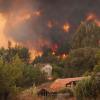Story ideas, media briefings, and press releases specifically for media. If you are a journalist, you can subscribe to receive upcoming press releases by email.
Press Releases

26 July 2023
Ammonia reduction should be prioritized in Europe’s fight against air pollution
Europe still faces numerous challenges in reducing air pollution. A new study by an international team of researchers identified the reduction of ammonia emissions as a cost-effective measure to reduce concentrations of fine particulate matter in the atmosphere.

26 July 2023
Hans Joachim (John) Schellnhuber appointed as IIASA Director General
It is our pleasure to announce the appointment of John Schellnhuber as the new IIASA Director General effective from 1 December 2023.

20 July 2023
Introducing the Climate Solutions Explorer
IIASA recently launched the Climate Solutions Explorer – a comprehensive resource that visualizes and presents vital data about climate mitigation, climate impacts, vulnerabilities, and risks arising from development and climate change.

17 July 2023
Addressing adaptation inequalities in climate research
A new study proposes ways to better incorporate adaptation in climate change research, addressing the uneven distribution of adaptation capacities and needs worldwide.

10 July 2023
First International Vienna Energy and Climate Forum
Registrations are open for the newly established International Vienna Energy and Climate Forum, which will take place for the first time on 2 and 3 November 2023 at the Hofburg Palace in Vienna. It will bring together high-level representatives from member states, international organizations, business, and science including youth representatives and more than 1,000 international experts to discuss best practices and present solutions to tackle climate change and achieve a green energy transition.

10 July 2023
Addressing justice in wildfire risk management
The unequal distribution of wildfire risk in our society is influenced by various factors, such as social vulnerabilities and intersecting forms of inequality, including gender, age, ethnicity, or disability. A new article calls for more integrated and inclusive wildfire risk management approaches and proposes a novel framework mapping different justice aspects.

05 July 2023
Affordable and available technologies can curb rising nitrous oxide emissions
Researchers from IIASA and the University of Maryland in the US have found that nitrous oxide, a potent greenhouse gas and stratospheric ozone-depleting substance, could be readily abated with existing technology applied to industrial sources.

05 July 2023
New IIASA online tool to visualize global migration patterns
IIASA researchers have developed a new tool – the Global Migration Data Explorer – to help address the lack of data on global migration flows and provide a visual method for exploring migration patterns worldwide.

27 June 2023
Revealing the power of citizen science for SDG advancement
A new collection in the journal Citizen Science: Theory and Practice demonstrates the potential of citizen science to aid in achieving the Sustainable Development Goals (SDGs) and other international agreements and frameworks. The authors call for urgent dialogue between citizen science practitioners, researchers, and decision makers to build partnerships and work together to advance citizen science for a sustainable world.
